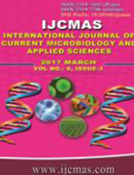


 National Academy of Agricultural Sciences (NAAS)
National Academy of Agricultural Sciences (NAAS)

|
PRINT ISSN : 2319-7692
Online ISSN : 2319-7706 Issues : 12 per year Publisher : Excellent Publishers Email : editorijcmas@gmail.com / submit@ijcmas.com Editor-in-chief: Dr.M.Prakash Index Copernicus ICV 2018: 95.39 NAAS RATING 2020: 5.38 |
Sustainable agriculture has become a burning issue due to “energy crisis” and “environmental protection”. One aspect of sustainable agriculture is Integrated Nutrient Management (INM). Many regions in India like Kashmir, Himachal and other hilly regions have huge potential for quality flower production. Since floriculture is energy and cost intensive type of farming, the input cost of fertilisers is very high, which can be avoided by going for alternative methods like INM. There is scant information available concerning the use of organic fertilizer as the sole source of nutrients in flower production, especially in the cultivation of flowers has made its applicability more difficult. INM is a practice that is being rapidly adopted by growers, combines the use of adjusted nutrient rates, more efficient fertilizer sources, organic matter and soil inoculation. INM holds great promise in exhibiting the growing nutrient demands of intensive farming like Floriculture and maintaining productivity at its optimum with holistic improvement in the quality of resource base, which is very much important in-case of cut and bulbous flowers. Investigations by many researchers have revealed the beneficial influence of INM, on vegetative (plant height, leaf area, leaf number), floral (first bud appearance, floral diameter, weight of flower) and yield attributes (seed weight, seed production) of many flower crops, reduced the cost of fertilizer inputs and increased the B/C ratio, despite maintaining a good soil physico-chemical environment. It can be concluded that by reducing the levels of chemical fertilizer and optimizing the dose of different organic fertilizer can improve yield and quality in ornamental crops without adversely affecting the edaphic and environmental features. Therefore this discourse will mainly discuss on the integrative approaches on production and management of many flower crops, commercially grown in India and Kashmir valley.
 |
 |
 |
 |
 |